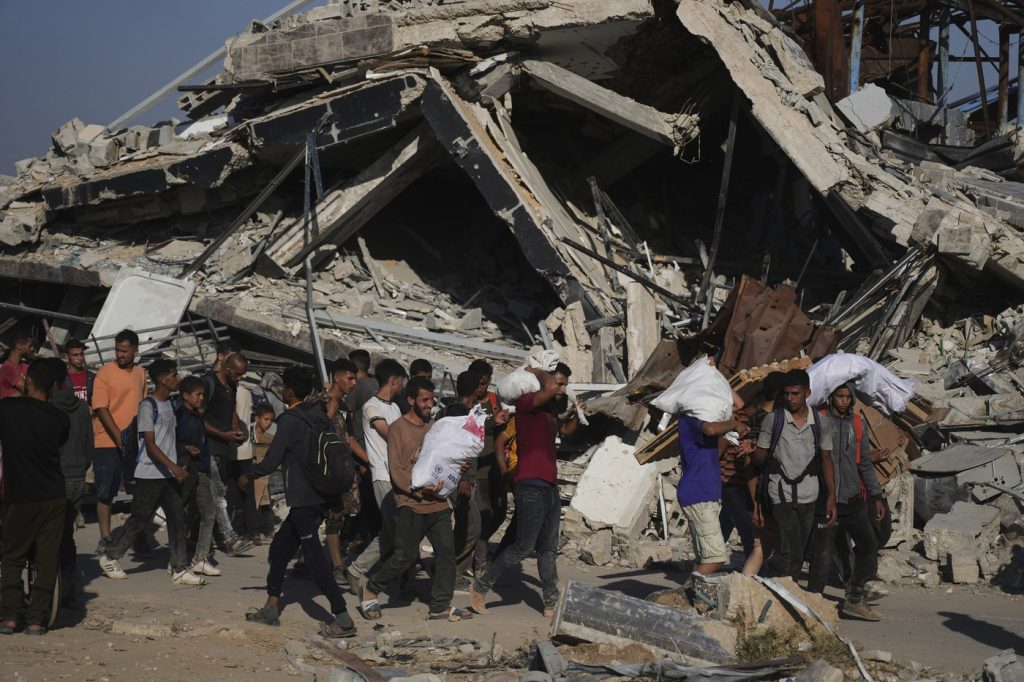DEIR AL-BALAH, Gaza Strip (AP) — Israeli airstrikes have claimed the lives of at least 34 individuals across Gaza, as reported by health staff, amidst a rapidly deteriorating humanitarian situation and tentative hopes for a ceasefire. The strikes, which began late Friday and persisted into Saturday morning, included an attack at Palestine Stadium in Gaza City that killed 12 people sheltering inside, and eight others who were living in nearby apartments. In southern Gaza, a separate strike resulted in six fatalities when a tent in Muwasi was hit.
Amidst the ongoing violence, U.S. President Donald Trump has indicated that a ceasefire agreement might be reached within the week. During a press briefing at the Oval Office on Friday, Trump stated, "We're working on Gaza and trying to get it taken care of." An anonymous official familiar with the situation revealed that Israel's Minister for Strategic Affairs, Ron Dermer, is scheduled to visit Washington next week for discussions regarding Gaza's ceasefire, alongside issues relating to Iran.
Negotiations for a ceasefire have been inconsistent since Israel's military campaign escalated following the breakdown of a ceasefire in March. The situation is further complicated by the continued existence of approximately 50 hostages in Gaza, of which less than half are believed to be alive. These hostages were part of a larger group of around 250 taken during Hamas's assault on Israel on October 7, 2023, initiating a protracted 21-month war.
The ongoing conflict has inflicted severe casualties on the Palestinian side, with over 56,000 reported deaths, according to Gaza's Health Ministry. This figure does not differentiate between civilian and combatant casualties, and more than half of the deceased are reported to be women and children. Hostage families remain hopeful that Trump's engagement in securing recent ceasefires could prompt more vigorous negotiations for a deal in Gaza. Meanwhile, Israeli Prime Minister Benjamin Netanyahu is experiencing heightened public support due to Israel's military achievements against Iran, potentially giving him the leeway to pursue an end to the conflict in Gaza, a move opposed by his far-right governing allies.
Hamas has consistently asserted that it is willing to release all hostages in exchange for an end to the hostilities in Gaza. In contrast, Netanyahu maintains that military operations will only cease once Hamas is disarmed and expelled from the territory, something the group has firmly rejected. This impasse exacerbates the already dire humanitarian conditions that Palestinians are enduring in Gaza, where food supplies have been substantially restricted. After blocking all food shipments for two and a half months, Israel has recently permitted only a minimal flow of supplies into the region since mid-May.
United Nations efforts to distribute food supplies have faced significant challenges due to armed gangs looting aid trucks and large crowds of desperate individuals attempting to access provisions. Palestinian witnesses have reported incidents of individuals being shot and injured while trying to reach feeding sites established by the Gaza Humanitarian Foundation, which is backed by American and Israeli support. Israeli military officials stated they are investigating claims of civilian harm during these incidents.
In summary, the situation in Gaza is fraught with violence and humanitarian distress, with international involvement potentially influencing the prospects for a ceasefire and resolution to the ongoing conflict.











